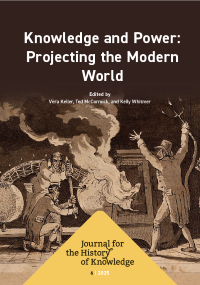Knowledge and Power: Projecting the Modern World

2025 Special Issue
Edited by Vera Keller, Ted McCormick, and Kelly Whitmer
Image: Unsound speculative schemes (tunneling, gas lighting and stock breeding), with W.H. Brown in attendance next to a statue of Hope (The School of Projects). Aquatint by Samuel De Wilde, 1809. Wellcome Collection.
Projects are tools for critical and historical analysis of the large-scale entangled changes that made modernity. They were, to borrow a phrase from Foucault, technologies of power that shifted, in a short span of time, many of the mores, valences, spiritual ends, and epistemic values associated with the modern world. However, they did not do so through a panoptic regime of total discipline and rationalized control. Rather, even as projects claimed to offer new mechanisms for eradicating waste, solving problems, and realizing untold profits by mobilizing underutilized people and materials, they engineered large-scale devastation. Analytically, projecting centers the violence and ignorance built into economically rationalized visions of the future. Historically, projects were not the ineffectual, laughable schemes many satires suggest, but all too impactful interventions upon the world. Our special issue shows what those impacts were, how they were configured as forms of knowledge, and how they interrelated with a global landscape of risk, possibility, and agnotology. Projecting embodied new dispositions of bodies, technologies, landscapes, and resources in dynamic interrelationships of speculation and risk – dispositions central to economy, politics, and science in the anthropocene. Projects offer us a new model for thinking about knowledge and power as truly entangled (that is, not as two distinct entities, with one serving the other) in both a distinctive rationality and irrationality that together shaped capitalism, global planetary interventions, and industrialization. Since projects continue to provide the conceptual tools through which the environmental effects of industrialization are now being tackled, it is essential that they be analyzed as a specific epistemology that arose in early modernity and shaped global capitalism and colonialism. Addressing their damaging legacies requires critically exploring projects as modes of intervention in the world.

